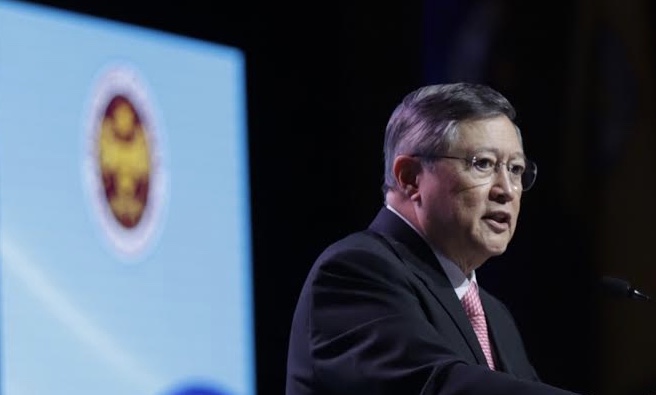PH eyes samurai bond sale in second half
3 min read
Finance Secretary Carlos G. Dominguez III. Photo courtesy of DOF
MANILA, Philippines — The Philippines is looking at selling yen-denominated samurai bonds in the second half, although the bulk of total borrowings will still be sourced locally, Finance Secretary Carlos G. Dominguez III said Tuesday.
“As you know, the Philippines always considers issuing a samurai bond in the second half of the year—that is our normal schedule. And, of course, we’re very pleased that the Japan Credit Rating Agency [JCR] has upgraded us to an “A-“ status, which will definitely help in the terms and the cost of the financing in samurai bonds,” Dominguez said, adding that he did not have details of the planned issuance yet.
JCR’s upgraded credit rating for the Philippines was the country’s first in the covered “A” grade level.
“The timely upgrade of the [JCR] to ‘A-‘ affects not only the government bonds or issues, but it will also open the eyes of foreigners to the possibility of making foreign investments either through direct investments or through buying our bonds, more likely,” Dominguez said.
A return to the samurai market this year will be the Philippines’ third-straight year to issue yen-denominated securities in Japan.
Prior to the COVID-19 pandemic, the Bureau of the Treasury was looking into a samurai issuance before Tokyo hosted the 2020 Summer Olympics originally scheduled in July, which had been postponed to next year instead.
So far this year, the Philippines already issued euro-denominated and US dollar-denominated global bonds, proceeds of which will be spent for the national budget and the government’s COVID-19 response, respectively.
While the Philippines was recently ramping up foreign borrowings through offshore bond issuances as well as loans from multilateral lenders and bilateral partners, Dominguez reiterated that the bulk or 70-75 percent of yearly total financing will come from domestic sources.
“We have a very healthy funds flow, and we are not in danger of stumbling or not having enough money anytime soon, so we are in a very good financial situation,” Dominguez said.
On Tuesday, the Treasury sold P15 billion in 35-day T-bills at an average rate of 2.101 percent, up from 2.065 percent two weeks ago.
National Treasurer Rosalia V. de Leon explained that the rates for the shortest treasury bill tenor were moving up because “banks want to be within inflation.”
As of end-May, headline inflation averaged 2.5 percent.
Tenders for the five-week IOUs maturing on July 22 reached P22.82 billion, making the auction oversubscribed.
The Treasury did not open the tap facility window for the 35-day securities, but it sold last Monday an additional P7.71 billion in 364-day T-bills to the 11 government securities eligible dealers (GSEDs)-market makers.
JPV
Read Next
EDITORS’ PICK
MOST READ
Subscribe to INQUIRER PLUS to get access to The Philippine Daily Inquirer & other 70+ titles, share up to 5 gadgets, listen to the news, download as early as 4am & share articles on social media. Call 896 6000.
For feedback, complaints, or inquiries, contact us.








